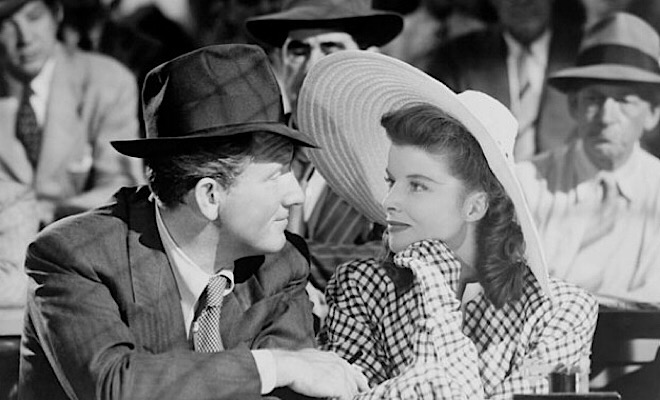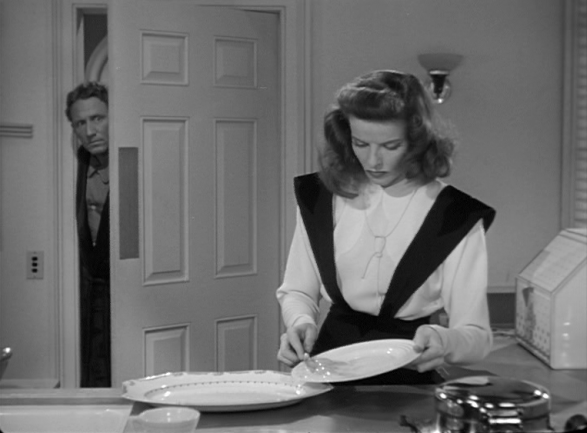
Can a woman really have it all? This is a question that seems more than a little ridiculous in 2018, but probably felt downright revolutionary in 1942. Or at least, in the context of Woman of The Year, a film in which Katherine Hepburn tries to tackle the commitments of both marriage and motherhood. Then on top of that, she also aims to balance the demands of working as a foreign newspaper correspondent as the war in Europe hangs over everything.
The “everything” I’m referring to is partially related to director George Stevens, who was known for successfully helming lighter fair like Cary Grant swashbuckler Gunga Din or Rogers/Astaire musical Swing Time throughout the 30s and 40s. But like fellow Hollywood legends like John Ford or Frank Capra, Stevens was enlisted to shoot newsreel films for the U.S. Army during World War II. Much like his contemporaries, the war seemed to change Stevens’ outlook considerably, as nearly all of his post-war films were dramas. However, despite Woman of The Year’s light moments coupled with the palpable chemistry between Hepburn and Spencer Tracy, it could easily be seen as a transitional film.
These lighter moments mostly happen in the first half of the film, which sees reporters Sam Craig (Tracy, actually looking young) and Tess Harding (Hepburn) feuding over baseball of all things. Though considering Sam is a sports reporter, this is not taken lightly, nor taken seriously by the multi-lingual political affairs correspondent Harding. However, their affection starts to blossom at a baseball game, in which Sam explains the rules of baseball in a charmingly written scene that feels quite fresh in this movie, but I’m sure would feel quite tedious if someone tried to write a similar scene now.
The two then continue to fall for each other at a dinner party in which Sam is a bit bewildered by the amount of worldly travelers hovering in Tess’s orbit. Then quite suddenly (because that’s just kinda how marriage worked in those days), Sam and Tess decide to marry. After eloping, cracks in their union start to form. First with Tess’s unflappable commitment to her career, but also with her inability to be a mother in exactly the way Sam wants her to be. For example, instead of giving Sam the traditional family he wants, Tracy adopts an orphan greek boy, which Sam gets all weird about.
As you could maybe tell from my descriptions of Woman of the Year, I wouldn’t consider this a full-on screwball comedy. Which I think stems from the fact that it might be impossible for a movie to remain fun and romantic if the couple at the center of it gets married in the middle. The whole tension in any romantic film is typically over whether or not the central couple will get together, so the flipside is that if a couple gets together early on, really the only tension can come from whether or not they’ll stay together.
Which isn’t to say that the light moments in this movie aren’t enjoyable. There’s a great bit of visual comedy in one of the film’s earlier scenes, where Spencer Tracy walks into a room full of women holding an award ceremony, and he (poorly) tries to hide the fact that he’s the only man in the room, by fumbling and then dropping a bunch of cigarettes. Meanwhile, there’s another visual gag-driven scene later on, involving Hepburn attempting to make a meal for Tracy (like a “normal” American housewife) though all the appliances go haywire.
I think this latter scene ends up being less funny than it’s supposed to be, since it’s hard to not feel sympathetic towards Tess instead of laughing at her. That said, you can easily see what makes the Hepburn/Tracy dynamic so special in Woman of the Year (their first of 9 films together). Hepburn is this smart, confident woman, questioning the traditional norm of gender stereotypes, back in a time when the woman’s place was thought to undoubtedly be in the home. Meanwhile, you have Spencer Tracy playing the face of male traditionalism. Though he has such a warm, gentle masculinity to him, that you can’t help but empathize with him, despite his conservative tendencies.
I recently watched the movie Adam’s Rib for the first time, a later Hepburn/Tracy vehicle dealing with similar themes about a woman’s place in society. I would say Woman of the Year feels like a bit of a warm-up for that film, considering the later film whole-heartedly embraces the “battle of the sexes” vibe that Woman of the Year lightly hints at. Also, it wasn’t surprising to hear that screenwriters Michael Kanin and Ring Lardner Jr. were unsatisfied with the film’s finale, as they were forced to rewrite a happy-ish ending at the last minute. So the film doesn’t quite end up living up to its progressive themes. But it is probably the earliest film in which I can remember hearing the word “feminism”, so that has to count for something, right?


